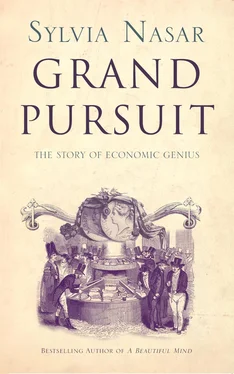In good times, he ate only the coarsest food—wheat and barley in the form of bread or mush. Even potatoes were a luxury beyond his reach. (“They are very well for you gentry but they must be terribly costly to rear,” a villager told Austen’s mother). 10Clark estimates that the British farm laborer consumed an average of only 1500 calories a day, one third fewer than a member of a modern hunter-gatherer tribe in New Guinea or the Amazon. 11In addition to suffering chronic hunger, extreme fluctuations in bread prices put him at risk of outright starvation. Eighteenth-century death rates were extraordinarily sensitive to bad harvests and wartime inflations. 12Yet the typical Englishman was better off than his French or German counterpart, and Burke could assure his English readers that this “slavery with all its baseness and horrors that we have at home is nothing compared to what the rest of the world affords of the same Nature.” 13
Resignation ruled. Trade and the Industrial Revolution had swelled Britain’s wealth, as the Scottish philosopher Adam Smith predicted in The Wealth of Nations in 1776. Still, even the most enlightened observers accepted that these could not trump God’s condemnation of the mass of humanity to poverty and “painful toil . . . all the days of your life.” Stations in life were ordained by the Deity or nature. When a loyal retainer died, he or she might be praised for “having performed the duties of the Station of life in which he had been pleased to place her in this world.” 14The Georgian reformer Patrick Colquhoun had to preface his radical proposal that the state educate the children of the poor with assurances that he did not mean that they “should be educated in a manner to elevate their minds above the rank they are destined to fill in society” lest “those destined for laborious occupations and an inferior situation in life” become discontented. 15
In Jane Austen’s world everybody knew his or her place, and no one questioned it.
A mere fifty years after her death, that world was altered beyond recognition. It was not only the “extraordinary advance in wealth, luxury and refinement of taste” 16Or the unprecedented improvement in the circumstances of those whose condition was assumed to be irremediable. The late Victorian statistician Robert Giffen found it necessary to remind his audience that in Austen’s day wages had been only half as high and “periodic starvation was, in fact, the condition of the masses of working men throughout the kingdom fifty years ago . . .” 17It was the sense that what had been fixed and frozen through the ages was becoming fluid. The question was no longer if conditions could change but how much, how fast, and at what cost. It was the sense that the changes were not accidental or a matter of luck, but the result of human intention, will, and knowledge.
The notion that man was a creature of his circumstance, and that those circumstances were not predetermined, immutable, or utterly impervious to human intervention is one of the most radical discoveries of all time. It called into question the existential truth that humanity was subject to the dictates of God and nature. It implied that, given new tools, humanity was ready to take charge of its own destiny. It called for cheer and activity rather than pessimism and resignation. Before 1870 economics was mostly about what you couldn’t do. After 1870, it was mostly about what you could do.
“The desire to put mankind into the saddle is the mainspring of most economic study,” wrote Alfred Marshall, the father of modern economics. Economic possibilities—as opposed to spiritual, political, or military ones—captured the popular imagination. Victorian intellectuals were obsessed with economics and an extraordinary number aspired to produce a great work in that field. Inspired by advances in natural sciences, they began to fashion a tool for investigating the “very ingenious and very powerful social mechanism” that is creating not just unparalleled material wealth, but a wealth of new opportunities. Ultimately, the new economics transformed the lives of everyone on the planet.
Rather than a history of economic thought, the book in your hands is the story of an idea that was born in the golden age before World War I, challenged in the catastrophic interwar years by two world wars, the rise of totalitarian governments, and a great depression, and was revived in a second golden age in the aftermath of World War II.
Alfred Marshall called modern economics an “Organan,” ancient Greek for tool, not a body of truths but an “engine of analysis” useful for discovering truths and, as the term implied, an implement that would never be perfected or completed but would always require improvement, adaptation, innovation. His student John Maynard Keynes called economics an “apparatus of the mind” that, like any other science, was essential for analyzing the modern world and making the most of its possibilities.
I chose protagonists who were instrumental in turning economics into an instrument of mastery. I chose men and women with “cool heads but warm hearts” 18who helped build Marshall’s “engine” and innovated Keynes’s “apparatus.” I chose figures whose temperaments, experiences and genius led them, in response to their own times and places, to ask new questions and propose new answers. I chose figures that took the story from London in the 1840s around the world, ending in Calcutta at the turn of the twenty-first century. I tried to picture what each of them saw when they looked at their world, and to understand what moved, intrigued, inspired them. All of these thinkers were searching for intellectual tools that could help solve what Keynes called “the political problem of mankind: how to combine three things: economic efficiency, social justice and individual liberty.” 19
As Keynes’s first biographer Roy Harrod explained, that protean figure considered the artists, writers, choreographers, and composers he loved and admired to be “the trustees of civilization.” He aspired to a humbler but no less necessary role for economic thinkers like himself: to be “the trustees, not of civilization, but of the possibility of civilization.” 20
Thanks in no small part to such trustees, the notion that the nine parts of mankind could free itself from its age-old fate took hold during the Victorian era in London. From there it spread outward like ripples in a pond until it had transformed societies around the globe.
It is still spreading.
Act I HOPE Contents Cover Title Page GRAND PURSUIT Sylvia Nasar THE STORY OF ECONOMIC GENIUS Dedication Preface: The Nine Parts of Mankind Act I: Hope Prologue: Mr. Sentiment Versus Scrooge Chapter I: Perfectly New: Engels and Marx in the Age of Miracles Chapter II: Must There Be a Proletariat? Marshall’s Patron Saint Chapter III: Miss Potter’s Profession: Webb and the Housekeeping State Chapter IV: Cross of Gold: Fisher and the Money Illusion Chapter V: Creative Destruction: Schumpeter and Economic Evolution Act II: Fear Prologue: War of the Worlds Chapter VI: The Last Days of Mankind: Schumpeter in Vienna Chapter VII: Europe Is Dying: Keynes at Versailles Chapter VIII: The Joyless Street: Schumpeter and Hayek in Vienna Chapter IX: Immaterial Devices of the Mind: Keynes and Fisher in the 1920s Chapter X: Magneto Trouble: Keynes and Fisher in the Great Depression Chapter XI: Experiments: Webb and Robinson in the 1930s Chapter XII: The Economists’ War: Keynes and Friedman at the Treasury Act III: Confidence Prologue: Nothing to Fear Chapter XIII: Exile: Schumpeter and Hayek in World War II Chapter XIV: Past and Future: Keynes at Bretton Woods Chapter XV: The Road from Serfdom: Hayek and the German Miracle Chapter XVI: Instruments of Mastery: Samuelson Goes to Washington Chapter XVII: Grand Illusion: Robinson in Moscow and Beijing Chapter XVIII: Tryst with Destiny: Sen in Calcutta and Cambridge Epilogue: Imagining the Future Notes Index Picture Section Acknowledgments About the Author Also by Sylvia Nasar Credits Copyright About the Publisher
Читать дальше












